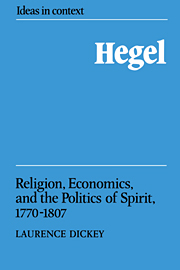Book contents
- Frontmatter
- Contents
- Preface
- Acknowledgments
- Introduction: Hegel in a Protestant cultural context
- Part I Hegel's Württemberg: “Civil Millenarianism” and the two faces of Protestant civil piety
- Part II Württemberg's Hegel: Applied theology and social analysis
- Part III Toward the Phenomenology: Sittlichkeit becomes a problem in social and political theory
- Epilogue: Bildung and politics: The “first class,” Christian pride, and “absolute spirit”
- Abbreviations
- Notes
- Index
Part III - Toward the Phenomenology: Sittlichkeit becomes a problem in social and political theory
Published online by Cambridge University Press: 11 January 2010
- Frontmatter
- Contents
- Preface
- Acknowledgments
- Introduction: Hegel in a Protestant cultural context
- Part I Hegel's Württemberg: “Civil Millenarianism” and the two faces of Protestant civil piety
- Part II Württemberg's Hegel: Applied theology and social analysis
- Part III Toward the Phenomenology: Sittlichkeit becomes a problem in social and political theory
- Epilogue: Bildung and politics: The “first class,” Christian pride, and “absolute spirit”
- Abbreviations
- Notes
- Index
Summary
Works of nature and art one does not get to know as they are finished; one has to catch them in their genesis to comprehend them.
GoetheI am persuaded that one can be clear, even in the poverty of our language, not by always giving the same meanings to the same words, but by arranging it so that as often as each word is used, the meaning given it be sufficiently determined by the ideas related to it.
RousseauIn the past, it was the work of the intellectuals to sublimate the possession of sacred values into a belief in “redemption.” The conception of the idea of redemption, as such, is very old, if one understands by it a liberation from distress, hunger, drought, sickness, and ultimately from suffering and death. Yet redemption attained a specific significance only where it expressed a systematic and rationalized “image of the world” and represented a stand in the face of the world. For the meaning as well as the intended and actual psychological quality of redemption had depended upon such a world image and such a stand. Not ideas, but material and ideal interests, directly govern men's conduct. Yet very frequently the “world images” that have been created by “ideas” have, like switchmen, determined the tracks along which action has been pushed by the dynamic of interest. “From what” and “for what” one wished to be redeemed and, let us not forget, “could be” redeemed, depended upon one's image of the world.
Weber- Type
- Chapter
- Information
- HegelReligion, Economics, and the Politics of Spirit, 1770–1807, pp. 181 - 185Publisher: Cambridge University PressPrint publication year: 1987



